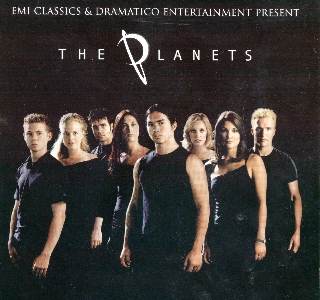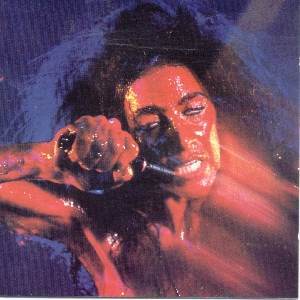Crossover music (which The Planets most definitely play) tends to throw classical music critics into something of a tailspin. The debut concert of this classical fusion band would have certainly been less of a task had we not had to sit through a dreary 30+ minute film about the group - replete with a countdown clock to the concert's actual start, reminiscent of something from Ready Steady Cook. Such charades are manipulative - and deadly. Many people just nodded off, or escaped for a drink, or much worse left (in retrospect, the clever people).
When they did arrive on stage, to a fanfare of Mars from Holst's Planet's Suite, the sense of anticipation had all but dissolved. They certainly looked good - tight vests (for the boys), bleached hair (for one boy) slim line figures (for all of them) - but could they actually play? Well, the answer is something of a double-edged sword. Amplification and electrification of instruments does nothing to tone (except mutilate it) - so it is almost impossible to judge whether these musicians had tone (apart from of the six pack variety). They played with some panache those pieces which required a limited virtuosity, but I question whether the Passacaglia-like interludes were really suitable for this band since they raised more problems of taste (or lack of it) than I have space for. The neo-accoustical arrangements by Mike Batt were contemptible without exception - examples of the worst kind, which turned Bizet into Malaga hyped loutishness and Bolero into a dizzy washout. It was all bad - except for a quite remarkable duet between Ben Pugsley (guitar) and Michael Kruk (percussion) which produced sparks of electricity to brighten up the blackout of all that preceded and followed it. Since this was virtually the only piece not to have been arranged by Mike Batt it speaks volumes.
Although there are nine actual planets there are only eight in this band. Is Mike Batt the ninth, I wonder? This is a Universe that has been discovered many times over - and there is nothing new here (if anything it is retrograde). One piece played by the band sums it up aptly: The Journey of A Fool (Batt).
In complete and utter contrast the legendary Diamanda Galas made a welcome return to the Festival Hall. A diva with a difference (not least the phenomenal voice which spans four octaves) her latest concert, La Serpenta Canta, was a springboard for songs from her past albums. Nothing quite hit home so powerfully as her performance of Todesfugue, based on the words of the German Holocaust poet Paul Celan. She sung in German, yet conveyed the anguish and grittiness of Celan's (often incomprehensible) writing in the starkest and most tragic of terms. Once heard it is a tour de force never to be forgotten.
Galas' works sits very uneasily in any category you may wish to place it - neo-classical, jazz, rock, whatever. La Serpenta, however, reveals a slightly warmer side to her repertory (there is no Plague Mass here [see picture], and little of the genocidal horror and disease etched songs which made up her repertoire in the 1980s and 1990s). Yet, whilst the songs might be less cathartic than those we have previously heard there is still no denying the mood that she so carefully sets. Alongside the spectral voice, which seems to loom like a threnody, and the anguish which that voice conveys, there is the careful lighting and the extraordinary pianism. The lighting on this particular evening was transcendental. Silhouetted on stage she is almost like one of Samuel Beckett's transfigured characters, a mouth and a voice are all that is often seen and heard. Yet, during one song a red light shone onto the piano and illuminated a script - an extraordinary image that exuded a powerful impression. The pianism is of a magnitude (in terms of mood and feeling) not often heard by some of the supreme virtuosos of our time - the Chopinesque 'death march', grotesquely reformed, which chimes for the sanctification of the outcasts, the sonorities that are arrestingly chanted like bass and soprano voices - all are magnificently done. Although classically trained as pianist Galas defies the instrument's limitations - with her, the piano becomes an extension of herself. It is used in obsessive ways to illustrate the schizophrenic, violent, extreme hostility of the lyrics.
Some will find her music arteriosclerotic, whilst others will find it life-affirming. A Galas recital is never a boring event - and this was an event.
Marc Bridle


 Return to:
Return to: